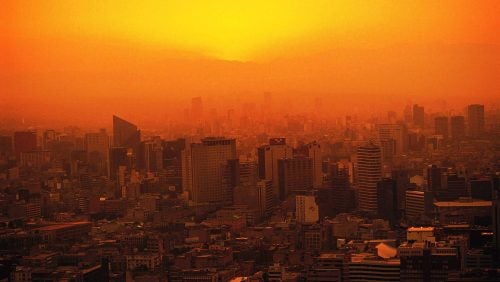Inadequate Protections for Workers In a Warming World
October 2, 2023 by Agnes Enochs

City skyline in orange haze
July 2023 was the hottest month on record. As extreme temperatures become the norm, many workers find themselves without adequate workplace protections. With heat-related deaths on the rise, more must be done to secure workers' safety in a warming world.
Ahead of U.N. meetings last week, tens of thousands of protestors marched on New York to demand that President Biden and other world leaders cease new oil and gas drilling and turn away from the fossil fuels heating our planet.[1] July 2023 was Earth’s warmest month on record.[2] In some places such as India, projections signal that, even for a healthy human resting in the shade, heat waves could cross the “survivability limit.”[3] As a graphic from the Climate Emergency Fund urged: “Stop thinking of this as the HOTTEST summer of the last 125 years. Start thinking of it as the COOLEST summer of the next 125.”[4]
The record-shattering heat threatens not only critical infrastructure but also the underpinnings of the country’s legal system. High temperatures have also exposed the inadequacy of laws to protect workers and a lack of preparedness for what is to come. According to provisional data from the CDC, heat was the contributing or underlying cause of 1,670 deaths nationwide in 2022.[5] The Biden administration announced it would add heat safety rules and a new enforcement initiative through the Occupational Safety and Health Administration (“OSHA”) in 2021,[6] but its enactment could take years due to the nature of the federal rulemaking process.[7] As there is currently no federal standard for those outdoor workers exposed to extreme heat, the issuance of workplace protections is left up to the states.[8] However, leaving such discretion to the states and their labor departments can prove dangerous.
On June 13 of this year, Texas Governor Greg Abbott signed into law the Texas Regulatory Consistency Act, barring cities and counties from enacting stricter regulations than the state’s.[9] By doing so, Abbott is superseding local rules in cities such as Dallas and Austin that require rest breaks for construction workers.[10] The law took effect on September 1.[11]
Some workers harmed or affected by extreme temperatures have found themselves left with few options for recourse. In Dallas, construction worker Mario Ontiveros was rushed to the hospital after working over ten hours in 112-degree heat, leaving him out of work for seven days.[12] With no help from work to pay for his medical bills, it was not financially possible for Ontiveros to take days at home to recover, despite doctors’ recommendations that he do so.[13]
With state and federal lawmakers and agencies failing to provide much of the necessary protection for workers amid record temperatures, litigation seems to be an increasingly key tool in securing climate justice. The UN Environment Programme (“UNEP”) and the Sabin Center for Climate Change Law at Columbia University found that, since 2017, the number of climate-related court cases has more than doubled.[14] Recently decided by a Montana state trial court, Held v. Montana marked the first climate-related constitutional lawsuit in the United States to go to trial.[15] Brought by 16 Montana youths, the plaintiffs sought injunctive relief against their state, challenging the constitutionality of Montana’s fossil fuel-based energy system.[16] For those states with environmental rights provisions, state constitutional law may serve as an important instrument for bringing similar future actions. However, the current legal patchwork still leaves many vulnerable in a warming world.
[1] Somini Sengupta, Hilary Howard & Delger Erdenesanaa, Climate Protesters March on New York, Calling for End to Fossil Fuels, The New York Times (Sept. 17, 2023), https://www.nytimes.com/2023/09/17/climate/climate-protests-new-york.html.
[2] Record Shattering: Earth Had its Hottest July in 174 Years, National Oceanic and Atmospheric Administration (Aug. 14, 2023), https://www.noaa.gov/news/record-shattering-earth-had-its-hottest-july-in-174-years.
[3] Astha Rajvanshi, Why Women are Especially Vulnerable During India’s Deadly Heat Waves, Time (June 23, 2023, 6:00 AM), https://time.com/6289448/india-extreme-heat-women/.
[4] Andy Rowell, Temperature Records are Being Shattered, So Why Do We Still Drill?, Oil Change International (July 26, 2019), https://priceofoil.org/2019/07/26/temperature-records-are-being-shattered-so-why-do-we-still-drill/.
[5] Provisional Mortality Statistics, Ctrs. for Disease Control and Prevention (Accessed Sep 29, 2023 2:13:40 PM), http://wonder.cdc.gov/mcd-icd10-provisional.html.
[6] FACT SHEET: Biden Administration Mobilizes to Protect Workers and Communities from Extreme Heat, The White House (Sept. 20, 2021), https://www.whitehouse.gov/briefing-room/statements-releases/2021/09/20/fact-sheet-biden-administration-mobilizes-to-protect-workers-and-communities-from-extreme-heat/.
[7] Jessica Boehm, Amid Historic U.S. Heat Wave, Workers Have Few Protections, Axios (July 21, 2023), https://www.axios.com/2023/07/21/worker-heat-protection-osha-regulation.
[8] Leah Shepherd, Federal Government Tackles Workplace Heat Hazards, Society for Human Resource Management (July 27, 2023), https://www.shrm.org/resourcesandtools/legal-and-compliance/employment-law/pages/biden-federal-heat-standard-.aspx#:~:text=There’s%20no%20federal%20standard%20for,statewide%20heat%20standards%20in%20place.
[9] Hannah Levitan, Amid a Record Heat Wave, Texas Construction Workers Lose their Right to Rest Breaks, NPR (July 21, 2023, 10:00 AM), https://www.npr.org/sections/health-shots/2023/07/21/1189179220/amid-a-record-heat-wave-texas-construction-workers-lose-their-right-to-rest-brea.
[10] Id.
[11] Id.
[12] Levitan, supra note 8.
[13] Id.
[14] UNEP Report Recognizes Litigation as Key Tool in Delivering Climate Action, International Institute for Sustainable Development (Aug. 2, 2023), https://sdg.iisd.org/news/unep-report-recognizes-litigation-as-key-tool-in-delivering-climate-action/.
[15] Held v. Montana, No. CDV-2020-307 (1st Dist. Ct. Mont., Aug. 14, 2023). The decision can be found online at https://westernlaw.org/wp-content/uploads/2023/08/2023.08.14-Held-v.-Montana-victory-order.pdf.
[16] Id.

